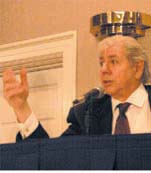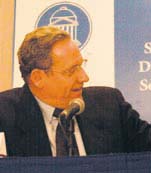
Woodward, Bernstein discuss good reporting
Scholars have said that no single story or incident has impacted the relations between the media and government as much as the Watergate Scandal, which led to 40 indictments and the eventual resignation of President Nixon.
Bob Woodward and Carl Bernstein, the two Washington Post reporters responsible for uncovering the government corruption, spoke on this topic Tuesday at the Tate Distinguished Lecture Series. Hugh Sidey joined them. He is currently a Washington contributor to Time, and has covered the American presidency longer than any other Washington journalist
“[Watergate] was about a vast, criminal and constitutional conspiracy headed by the president of the United States, and the attempt of the president of the United States, and the people around him to hide, illegally, that conspiracy,” Bernstein said.
The hour-long student forum centered primarily around the Watergate scandal.
Watergate revealed to the American public that “nobody is above the law, including the president of the United States,” Bernstein said. This is a great principle to establish and has now been permanently established, Bernstein said.
Americans began to look at the media as a more trusted source of information than ever after the scandal. Sidey said this government drama expanded the power of the media dramatically. The speakers discussed the effect of Watergate on media relations with the government. This situation is often referred to as the incident that transformed the media reputation from “watch dog” to “attack dog.”
“[Watergate] changed the dynamic in a basic way between press and public officials, not for the better,” Bernstein said. “The legacy [of Watergate] came to be a system of adversaries, between press and public officials, and the manufacturing of controversy, by the press, in preference to illumination.”
Media has also gradually evolved to be overly invasive, according to Bernstein and Sidey, not only in the lives of public officials, but also in celebrity lives and all other aspects of media coverage. Sidey attributed this invasiveness to the Clinton scandal and affairs, while Bernstein counter-attributed it to the Gary Hart affair.
The camaraderie between the journalists was clearly evident as they joked and reminisced about those days in the early 70s that Watergate was beginning to surface. Woodward was on to the story and Bernstein quickly jumped in because he picked up on the fact that “this was something of real consequence.” Within days of their first lead, Woodward and Bernstein were aware of some kind of cover-up and numerous shredded documents.
The two laughed as Bernstein told the story of the time he called John Mitchell, the then Attorney General controlling the secret White House fund in charge of Nixon’s undercover operations, to ask for comment on the story that would be published the next day.
The journalists also commented on one of the most popular recreations of Watergate. The movie “All the President’s Men”, based on the national best-seller co-authored by Bernstein and Woodward, directed by Alan J. Pakula was “quite accurate” and “shows what real reporting is all about”, Woodward said. Due to the fact that he hasn’t seen “Dick”, another Watergate based movie, he couldn’t comment on its accuracy.
Real reporting can be seen in “All the President’s Men” but good reporting can be summed up as “the best attainable version of the truth,” Bernstein said. “We did a good job,” he said in reference to their in-depth coverage of Watergate. Though they consider the job they did a success Woodward voiced his speculation that, “Historians will say we were naïve.”
The 4,000 to 5,000 hours of Nixon’s tapes, which Woodward referred to as “the gift that keeps on giving” can be found at the National Archives website. The tapes reveal him “regularly ordering crimes and using the Presidency as an instrument of revenge to ‘screw’ his enemies,” Woodward said.

Woodward, Bernstein discuss good reporting










